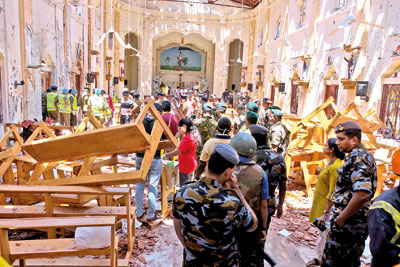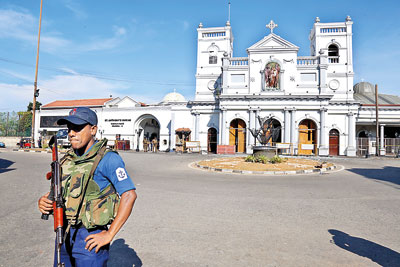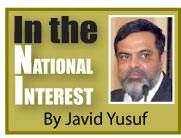News
Easter Sunday attacks-The need to act with foresight
View(s):In the wake of unexpected and unprecedented terror attacks unleashed on innocent human beings on Easter Sunday, it is not surprising that the country is still trying to figure out what went wrong and why it happened.

There is the need to ensure that the needs of the victims of the blasts and their families are addressed
In a democratic society, where informed discussion and decision making plays a big part in addressing issues faced by the country, it is only natural that everyone has opinions and theories about what may have happened. These theories can be tested out through discussions and dialogues within civil society forums, which can better inform those concerned.
Yet, when it comes to Government and decision makers, including all legislators, the responsibility is greater. The issues have to be examined dispassionately and from all angles, with a view to providing a solution that ensures non recurrence of the type of violent terrorist acts that the country had to face last month. Medical personnel are familiar with the fact that a wrong diagnosis or wrong medical treatment can, not only not cure the malady, but can have unintended side effects. Dealing with complex social issues require much more reflection and study, before action is taken.
It is also necessary to prioritise what action should be taken in the immediate aftermath of the attacks. The first is to ensure the security of the people and the country. The second is to bring the perpetrators to book. This the Government seems to be doing satisfactorily, although there is still some degree of fear among the people, mainly because of the Government’s chronic inability to effectively communicate what action it has taken, as well as the irresponsibility of sections of the media, in the manner of reporting current happenings.
There is also the need to simultaneously ensure that the needs of the victims of the blasts and their families are addressed. It is not only their physical needs that have to be met, but psychosocial support to mitigate the impact on them and their families. This task falls not only on the Christians, but the entire country, which must consider it a national priority.
An examination of some of the public responses clearly demonstrate some degree of confused thinking and a “Koheda Yanney Malle Pol” approach to the issues revolving around the tragic events that took place on Easter Sunday. If such courses of action are followed, without a rigorous examination of the pros and cons of the suggested solutions, the country may be lulled into a false sense of complacency, that everything has been taken care of, but the pathway to acts of terrorism may not have been closed.

Security outside St. Anthony's Church
One of the knee-jerk solutions that have been offered is the regulation of Madrasas. The issue of regulating the Madrasas, which mainly conduct religious teaching, has been engaging the attention of the Muslim community for a considerable length of time, mainly, to raise the quality of religious education, as well as to ensure a uniform curriculum. Even prior to these incidents, the Ministry of Muslim Affairs has addressed this issue and it is believed that a uniform curriculum is already being implemented.
The issue of regulating Madrasas is not likely to be objected to by anyone from within the Muslim community. It is, however, more prudent to have a common mechanism to monitor religious teaching in institutions of all religions, rather than only in Madrasas, because it will be in conformity with the principle of sensitivity, when handling situations of this nature, and avoid accusations of targetting a particular community.
In setting up such a regulatory mechanism, one has also to guard against the intrusion of the State into religious education and the values it can impart.
But, what is more critical to the current discussion is that, by regulating Madrasas, the current concerns will not be addressed. It is very apparent that the germ of indoctrination that finally manifested itself in the recent terror attacks did not originate in the Madrasas, but on online terrorist platforms. Many of those who were involved in the terrorist attacks were highly educated individuals, whose interest may have been aroused initially by accessing such terrorist sites.
Thereafter, they may have pursued such interests through the internet, in the seclusion of their rooms, over a period of time, which resulted in their absorbing a terrorist mindset.
Thereafter, their interests may have been fertilized by the interaction with others of their ilk. Another feature of such a phenomenon is that, these activities are carried out clandestinely and not in public forums. This is not only an unconscious recognition by such individuals that, what they are engaged in is unacceptable, but prevents their perceptions being corrected through intellectual and religious interaction.
 The need to monitor the accessing of terrorist sites by individuals is therefore, imperative. Otherwise left to themselves, those who do so may begin a journey of their own and end up on a ‘lone wolf’ operation like in New Zealand recently. And such ‘lone wolves’ can emerge from any community or from any strata of society. In developing such monitoring mechanisms, care should be taken to consult human rights experts, to ensure that such processes do not infringe on democratic norms and that the country does not descend to a State that rules by surveillance.
The need to monitor the accessing of terrorist sites by individuals is therefore, imperative. Otherwise left to themselves, those who do so may begin a journey of their own and end up on a ‘lone wolf’ operation like in New Zealand recently. And such ‘lone wolves’ can emerge from any community or from any strata of society. In developing such monitoring mechanisms, care should be taken to consult human rights experts, to ensure that such processes do not infringe on democratic norms and that the country does not descend to a State that rules by surveillance.
Another response articulated in different forums is that, there should be a uniform Law for all individuals in this country. In fact, there is a uniform Law for all citizens subject to a very small area, which relates mainly to personal Laws. In the case of Muslims, it is only confined to Marriage, Divorce and its consequences, inheritance and the administration of Mosques. How the existence of such a Law is related to terrorism is difficult to fathom, more so because it has existed in our statute books for such a long period of time.
In contrast, the All Ceylon Jemmiyathul Ulema (the apex body of theologians) had responded to the reasonable request of the security forces, by requesting Muslim women not to use the face covering. This was done even before the ban on the face veil was imposed by the Government.
This was mainly to assist the security operations in the country, although there was no evidence that any of those involved in the terrorist attacks had used face veils. Nor had there been any concern regarding the face veil at any time during the 3-decade-old civil war in the country.
It is important to respond to the challenges in the country in a way that will ensure that the objectives of those responses are met.
An example of a wrong response to a critical situation is the case of the passage of the 6th Amendment to the Constitution. When Parliament passed the 6th Amendment in haste, with the public galleries closed, in a knee-jerk reaction to the anti-Tamil pogrom of 1983, it did not realise that, by excluding the Tamil polity from the democratic mainstream, it drove the democratic movement underground, which resulted in terrorism in a virulent form. Fortunately, many of the hasty solutions suggested in the aftermath of the April tragedy, may not result in such a disaster. What is more likely is that, by mistaking the woods for the trees, the country may be lulled into complacency by the wrong steps taken. As a result, the country’s gaze may be elsewhere, when, to use Rugby parlance, one or more ‘lone wolves’ may work the blind side and wreak havoc on the country. God forbid.
(javidyusuf@gmail.com).

